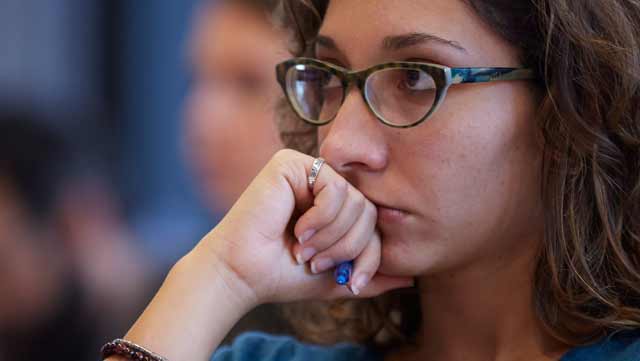THE MASTER'S PROGRAM AT A GLANCE
The AWG master's program at a glance
- Degree: Master of Arts Scope: 120 ECTS credits
- Regular period of study: 4 semesters
- Admission: winter semester only
- Application period: 1 May to 15 June annually
- Costs: none, but semester contribution
Learn to understand the complex relationships between work, the economy, and society.
Master of Arts in Labor, Economics and Society (Economic and Sociological Studies) focuses on the socioeconomic analysis of structural change in work, the economy and society. How do economic and social inequalities arise? What are the consequences of social change or crises? What are the challenges of the future? In our master's program, we want you to take an intensive look at issues in sociology and economics. The interdisciplinary perspective on structural change will give you greater understanding of causes and enable you to develop your own solutions.
We encourage interdisciplinary thinking.
Our program is designed for students of socioeconomics and anyone else who wants to build upon a bachelor's in a single subject or interdisciplinary program. If you want to research and understand the mechanisms and conditions of societal security, social integration, and welfare with sound empirical approaches, you are in the right place.
4 questions, 4 answers
Watch our filmed interview with students in both areas of the program—economics and sociology. Teaching staff were asked 4 questions about the socio-economic approach and curriculum: Interview with students in the AWG program (4:25 minutes)
Course structure
The master's program consists of 6 modules.
Module 1: Theory is the beginning of everything
The master's program consists of 6 modules. In the first semester, you will take the Theory module (12 ECTS credits), which lays the theoretical groundwork for both disciplines. There are 2 courses on important classics and a comprehensive examination of the theoretical foundations necessary to understand different viewpoints on justice, inequality, market logic, and welfare production.
Module 2: Research methods
In the Methods module (18 ECTS credits), you will acquire basic and in-depth knowledge of quantitative and qualitative research methods in empirical economic and social research. This module is itself organized as a modular system. All students are required to take the basic methods course in their first semester. In the following semesters, you can choose 2 more methods courses from a wide range of options and based on your own knowledge and interests. The elective module imparts more knowledge.
Module 3: Your own research
The unique selling point and centerpiece of the master's program is the research workshop. This is where the entire cohort and 2 lecturers representing both disciplines meet and exchange. In the workshop, individual teams propose topics they want to research. With the new skills from the methods module, it's time to get started: once their topic has been approved, students write a concept, choose a method, and carry out their own research, alone or in tams. The module Research (24 ECTS credits) consists of 2 courses, Research Workshop 1 and 2. These courses take place in the second and third semesters and each take 4 course hours per week.
Module 4: Change your perspective.
The interdisciplinary specialist course module (24 ECTS credits) offers you the opportunity to approach various topics from a sociological or economic perspective. It comprises 2 economics and 2 sociology courses to ensure that you can study both disciplines in depth. The entire module lasts 3 semesters.
Module 5: Ample freedom is a must.
In the elective and transfer module (12 ECTS credits), you can take further specialized courses according to your interests. They must meet the following criteria:
- courses from the other modules of the degree program
- courses that you attend alongside other master's programs in the department and in which knowledge exchange with society at large or with promising prospects can be developed
- open courses in other master's programs in the Faculty of Business, Economics and Social Sciences
- language courses from the Language Center with a maximum of 6 ECTS credits As a rule, you must take 2 classes (depending upon the ECTS credits awarded). The elective and exchange module runs for 3 semesters.
Module 6: Master's thesis—6 months for your masterpiece
You will write your master’s thesis during the final module (30 ECTS credits) in the fourth semester. You will focus on a specific topic, either in sociology or economics.
Ideally, your research work should follow on from the project in the research workshop or be significantly benefit from it. You will use the methodological, theoretical, and academic skills you learned in the other modules.
You have 6 months to complete your master's thesis. This is usually 50–70 pages and, as described above, it focuses on a topic in sociology or economics. Your diploma will show your focus area. Ideally, you should look for someone during your third semester to supervise your work.
Commitment pays off!
You can also attend extracurricular courses, e.g., computer courses from the Regional Computing Center, other language courses, or courses from the Universitätskolleg. Coursework in these courses is not factored into your degree. It will, however, be acknowledged in a certificate attesting to extracurricular courses and achievements that is issued together with your degree documents.
Please also take a look at the course guide (PDF). This contains detailed course descriptions. A good overview of the degree program can be found in the program guide (PDF).



